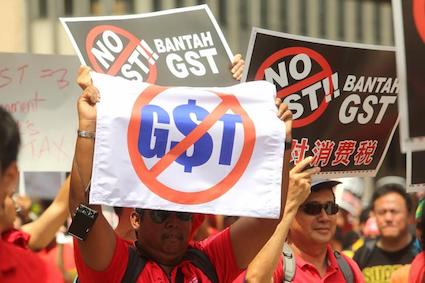Malaysia’s GST is now zero, but fiscal challenges remain, say economists

(Today Online) – Malaysia’s Goods and Services Tax (GST) effectively comes to an end today (June 1) as the new Pakatan Harapan (PH) government fulfils a key pledge it made since coming to power.
But while a cash-strapped public celebrates the move, some economists are cautioning that it will not lead to a dramatic drop in the price of daily goods.
Others warn that the government will need to come up with new sources of revenue to plug the gap caused by implementing the zero-rated GST.
“We should not expect a drastic reduction in prices. Prices are more influenced by other structural problems in the economy,” said economist Noor Azlan Ghazali of Universiti Kebangsaan Malaysia (UKM).
These structural issues include the price of fuel and an agriculture sector that does not produce enough food to meet local demand, Mr Noor Azlan told a forum on GST.
“Purchasing power is linked to wages. If wages are higher than the inflation rate, people will say things are affordable. But if inflation outpaces wages, then things become expensive.”
From Sept 1, the government will bring back GST’s predecessor, the sales and services tax (SST).
Going by what the PH government has said, SST will not be a broad-based consumption tax and will only be levied on a handful of items and services.
The previous Barisan Nasional (BN) government said it collected an average of RM42 billion (S$14.2 billion) annually in GST ever since the tax came into effect in 2015.
In contrast, the SST will only be able to collect an average of RM4 billion a year, said Finance Minister Lim Guan Eng on Thursday.
The scrapping of the GST will blow a RM$21 billion hole in the Malaysian government’s wallet, but this would be offset by rising oil-related revenues, spending cuts on non-essential projects, increased dividends from government-linked firms and the new SST, allowing the country to still be able to meet its budget deficit target for 2018, he added.
“But you can only cut or save so much. They will reach a threshold where you cannot cut or save any more, otherwise you won’t be able to ensure minimum proper functioning (of the government),” said independent economist Azrul Azwar Ahmad Tajuddin.
“Cost-cutting, waste-busting, leakage reduction are not sustainable solutions in the long run. The government still needs steady revenue streams to pay for all its promises, such as bringing back targeted fuel subsidies and abolishing highway tolls.”
SST IS MORE WORK
GST was introduced by the Najib Razak administration as a way to make up for declining oil revenues.
But nationwide anger towards the tax led to BN’s historic defeat in thr 14th General Election. PH campaigned on the promise to abolish GST if it came to power.
In many ways, GST and SST are polar opposites. The first is levied on consumers, while retailers, wholesalers, importers and producers act as tax collectors for the government. SST is charged primarily on producers and importers.
GST is charged on everything except items and services on an “exempted” list. SST is charged on a limited list of items and mostly on manufacturers.
SST is different from the 10 per cent “service charge” that higher-end restaurants can levy on customers.
With SST, the government has to work harder to ensure that producers and importers comply with the directive, said Mr Azrul Azwar.
“Enforcement of GST is easier because it is broad-based. With SST, you have to ensure that those who are taxed pay and that only they get to charge the tax.”
Even if the tax is not officially passed down to consumers, producers and importers can still hide it by marking up prices down the supply chain, he said.
“But if the government reintroduces the old SST, with its limited list, the impact on prices could be rather minimal.”
Going forward, Mr Azrul Azwar said, this is the best time for the government to consider new progressive taxes aimed at the wealthy and super privileged to replace lost revenue from GST.
This could include a capital gains tax on profits from securities trading, an inheritance tax on beneficiaries of estate or patrimony from a previous generation, and a windfall tax on companies that make extraordinary profits.
“There should also be a change in the tax rate for upper-income earners. Someone who makes RM10,000 a month should not be taxed at the same rate as a person who makes RM100,000 a month.”

